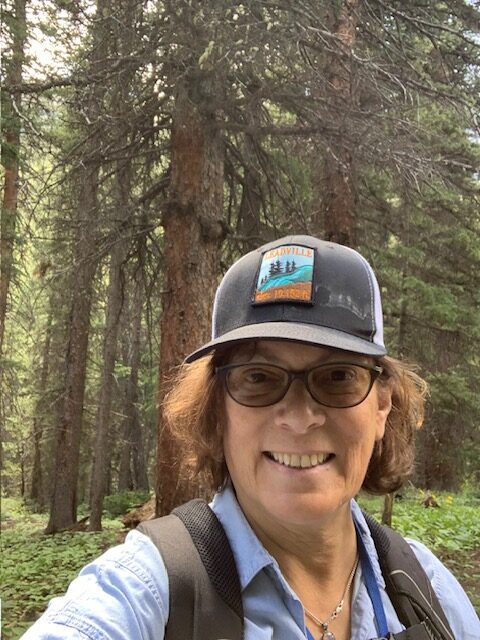
28 Jul Telluride Mushroom Fest: Dr. Barbara Thiers on “Mycology of George Washington Carver!”
The Telluride Mushroom Festival is back for the 43rd year in a row. In just a few weeks from now, the Town of Telluride will be taken over by amanita hat-wearing, mold- and spore-worshipping mycelium fanatics.
(Sorry, the event is sold out. And there is no waiting list. But day passes are available.)
Go here for more on the history of the Telluride Mushroom Festival. (Scroll back to 2009.)
Festival guest Dr. Barbara Thiers will be speaking about the mycology of George Washington Carver. For more, please read on. And listen to her podcast.

Dr. Barbara Thiers, courtesy Thiers.
It is, well, nuts to think that George Washington Carver’s only claim to fame was the domestication and promotion of the peanut. The William and Lynda Steere Herbarium contains evidence of yet another of his major contributions: documenting fungal diseases of plants which, among other things, is an important cause of crop loss on farms.
According to the Herbarium:
“…often overlooked in accounts of Carver’s accomplishments is his deep and abiding interest in mycology, the study of fungi. During his years at Iowa State, Carver developed a talent for collecting fungal specimens, and almost immediately after arriving at Tuskegee, he began to collaborate with Franklin Sumner Earle, who was then the chair of biology and horticulture at the Alabama Polytechnic Institute at Auburn. Together, the two worked to compile a preliminary list of the fungi of Alabama…”
Written by Elizabeth Gilbert of “Eat, Pray, Love” fame, “The Signature of All Things” spans the life of the fictional Alma Whittaker, a keenly curious and practical amateur botanist who comes of age on her wealthy father’s Philadelphia estate. She falls in love, travels abroad, and arrives at a startling understanding of evolution – just before Charles Darwin releases his groundbreaking work…
Alma’s thing was moss. Dr. Barbara Thiers (pronounced “Tears”) is Hepaticae, a class of Bryophyta comprising the liverworts which she has studied most, if not all, of her professional life. But what the fictional and the real woman share is a brilliant, inquiring mind and a profound love of the natural world.
“In particular, I am interested in the systematics and morphology of the largest family of Hepaticae, the Lejeuneaceae. This family is primarily tropical in distribution, and its members can be found growing, often profusely, on the bark and sometimes on living leaves of trees in tropical rainforests. My studies of these small but beautiful plants have taken me to Australia, Colombia, Dominican Republic, Ecuador, French Guiana, Papua New Guinea, Puerto Rico and Venezuela,” explained Thiers.
As the emeritus Patricia K. Holmgren Director of the William and Lynda Steere Herbarium for 20 years, Dr. Barbara Thiers was responsible for overseeing the Garden’s 7.9 million collections of algae, bryophytes, fungi and vascular plants and the approximately 30 staff members who manage these collections.
The Steere Herbarium is the largest in the Western Hemisphere, and third largest on the planet. It is also the world’s most heavily used herbaria in terms of the number of specimens loaned or imaged on demand, and the number of visitors.
Thiers is also Past President of the American Society of Plant Taxonomists (2020-2021); Past President of Society for the Preservation of Natural History Collections (2020-2022); a member of the Board of the Natural Science Collections Alliance; and member of the External Advisory Board of iDigBio, the national collections digitization hub; and author of “Herbaria: The Quest to Preserve and Classify the World’s Plants,” (Timber Press, 2020).

“Herbarium” is an enquiry into this unique field of plant biology, exploring how herbaria emerged and have changed over time, who promoted and contributed to them, and why they remain such an important source of data for their new role: understanding how the world’s flora is changing.
“My strong interest in the history of botanical collecting and the history of the herbarium; this interest has culminated in my book..”
For more on Dr. Barbara’s life and work and her upcoming talk at the Telluride Mushroom Festival, listen to her podcast:


Sorry, the comment form is closed at this time.